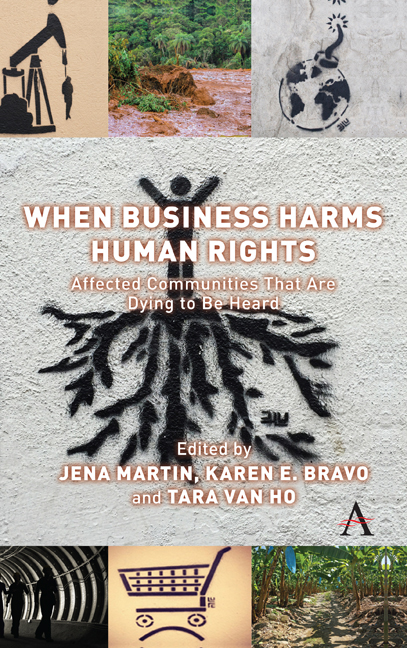Book contents
- Frontmatter
- Contents
- Preface
- Acknowledgements
- Introduction
- Chapter 1 Complicity in False Arrest, Imprisonment and Theft by a Fairtrade-Certified Company
- Chapter 2 Hindrances to Access to a Remedy in Business-Related Cases in Colombia: The Case of Gilberto Torres
- Chapter 3 The Global Pursuit for Justice for DBCP-Exposed Banana Farmers
- Chapter 4 The Rupturing of the Dam and the Community’s Social Fabric: A Testimony from an ‘Atingido’ from Bento Rodrigues, Brazil
- Chapter 5 Taming the Dragon, Unpacking Options for Access to Remedy for Violations by Chinese Multinational Corporations Operating in Chiadzwa, Zimbabwe
- Chapter 6 Máxima Acuña: The Story of How a Business Impacted Human Rights Defenders
- Chapter 7 Community Interrupted, ‘Life Projects’ Disrupted: Cajamarca, Ibagué, and the La Colosa Mine in Colombia
- Chapter 8 Occupational Health as a Human Right: A Case Study in a Turkish Free Trade Zone
- Chapter 9 The Price of the ‘Black Dollar’: Veteran Coal Miners and the Right to Health
- Chapter 10 Abandoned: A Tale of Two Mine Closures in South Africa
- Conclusion
- Appendices
- List of Contributors
- Index
Chapter 9 - The Price of the ‘Black Dollar’: Veteran Coal Miners and the Right to Health
Published online by Cambridge University Press: 20 January 2022
- Frontmatter
- Contents
- Preface
- Acknowledgements
- Introduction
- Chapter 1 Complicity in False Arrest, Imprisonment and Theft by a Fairtrade-Certified Company
- Chapter 2 Hindrances to Access to a Remedy in Business-Related Cases in Colombia: The Case of Gilberto Torres
- Chapter 3 The Global Pursuit for Justice for DBCP-Exposed Banana Farmers
- Chapter 4 The Rupturing of the Dam and the Community’s Social Fabric: A Testimony from an ‘Atingido’ from Bento Rodrigues, Brazil
- Chapter 5 Taming the Dragon, Unpacking Options for Access to Remedy for Violations by Chinese Multinational Corporations Operating in Chiadzwa, Zimbabwe
- Chapter 6 Máxima Acuña: The Story of How a Business Impacted Human Rights Defenders
- Chapter 7 Community Interrupted, ‘Life Projects’ Disrupted: Cajamarca, Ibagué, and the La Colosa Mine in Colombia
- Chapter 8 Occupational Health as a Human Right: A Case Study in a Turkish Free Trade Zone
- Chapter 9 The Price of the ‘Black Dollar’: Veteran Coal Miners and the Right to Health
- Chapter 10 Abandoned: A Tale of Two Mine Closures in South Africa
- Conclusion
- Appendices
- List of Contributors
- Index
Summary
Introduction
Natural resource extraction has played a diminishing role in the economies of affluent nations in the post-industrial economy. Although the United States, like much of the Global North, continues ‘to consume vast quantities of natural resources, the contribution of extractive industries to total employment and to total national economic production – as typically measured by gross domestic product – has been declining for decades’. Scholars have attributed this decline to everything from mechanization to coal's failure to achieve cost-competitiveness with other energy-generating natural resources to consumer demand for clean energy. This national-level pattern has manifested itself across the United States in a variety of regions, including Appalachia, whose economies have been historically dominated by the extractive industries, including coal mining, since the mid-1800s. Indeed, Appalachia's identity as a region is inextricably intertwined with coal mining, notwithstanding that relatively few Appalachians are employed in the mining industry today.
This tendency for many in a community to identify with an industry that was historically important in the local economy, but that may not be any longer, is regularly exploited by extractive industries to maintain their political influence, which is often used to avoid government regulations aimed at ensuring the protection of the environment and public health.
West Virginia is also home to one of the highest per capita veteran populations in the United States. In fact, West Virginia had the highest per capita service and sacrifice rates in the country during the Vietnam War. Military service is similar to coal mining insofar as: (1) enlistees are predominantly young, resource156 deprived and have little to no higher education beyond high school and (2) the work is extremely dangerous. Moreover, and much like mining, military service exacts a significant toll on the human body and mind. A recent literature review assessing the mental health consequences of the Iraq and Afghanistan wars found ‘clear evidence of higher rates of homelessness, alcohol abuse, domestic violence, relationship breakdown, and criminality’ among veterans of those conflicts with untreated mental health conditions. Reports further indicate that veterans are more likely to be unemployed than non-veterans, account for 20 per cent of US suicides, and comprise nearly 20 per cent of the American homeless population.
- Type
- Chapter
- Information
- When Business Harms Human RightsAffected Communities that Are Dying to Be Heard, pp. 155 - 182Publisher: Anthem PressPrint publication year: 2020

